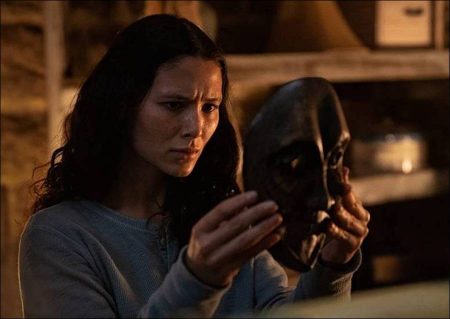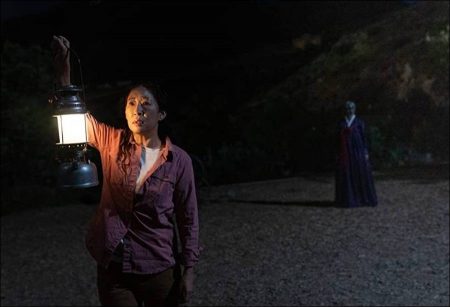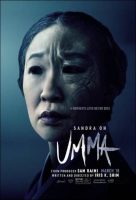Umma Movie Storyline. A Korean immigrant, Amanda (Sandra Oh), and her daughter Chris live on a rural farm, raising bees and living a quiet life without modern technology. When Amanda receives the cremated ashes of her deceased estranged mother, it unleashes a vicious spirit intent on taking her body for itself.
Umma is an American supernatural horror film, written and directed by Iris K. Shim. It stars Sandra Oh, Fivel Stewart, MeeWha Alana Lee, Tom Yi, Odeya Rush, and Dermot Mulroney. Sam Raimi serves as a producer on the film. The film is scheduled for release on March 18, 2022 by Sony Pictures Releasing.
In January 2020, it was announced Sandra Oh had joined the cast of the film, with Iris K. Shim, directing from a screenplay she wrote, with Sam Raimi producing under his Raimi Productions banner. In October 2020, Fivel Stewart, Dermot Mulroney, Odeya Rush, MeeWha Alana Lee and Tom Yi joined the cast of the film, with Stage 6 Films set to produce, and Sony Pictures Releasing to distribute.

Film Review for Umma
It’s an eternal middle-aged anxiety: “I feel like I’m turning into my mother.” And it’s given a most literal rendering in Iris K. Shim’s supernatural horror exercise “Umma,” in which Sandra Oh stars as a rural beekeeper inhabited by the vengeful spirit of her estranged mom. But while that premise might sound like the makings of a tongue-in-cheek body-swap fright-fest, “Umma” has far heavier issues on its plate, which proves both its chief virtue and its ultimate undoing, as it never manages to thread the needle between its horror setpieces and the more serious themes of generational trauma lying beneath.
Set in an unnamed stretch of American farmland, “Umma” opens on Amanda (Oh), a resourceful first-generation Korean American who has managed to construct a stable life selling organic honey to a devoted online fanbase of influencers. Not that she knows what the terms “influencer” or “online” even mean: owing to a professed allergy to electricity, Amanda lives entirely off the grid, using analog machinery and candles around the house, and enforcing a strict ban on cellphones and gadgets on her property. A rugged local shop owner (Dermot Mulroney) stops by once a week to collect and sell Amanda’s latest honey haul, but other than that, she and her homeschooled teenage daughter Chrissy (Fivel Stewart) are virtually cut off from the outside world.
The root cause of Amanda’s aversions isn’t hard to guess, as the film begins with the first of several flashbacks to her nightmarish childhood with an abusive mother, who used to administer electric shocks as punishment for “disobedience.” Amanda’s traumatic past is entirely unknown to Chrissy, however, and she has begun to yearn for a life outside the 19th-century-style confines of her mother’s warm but eccentric embrace, secretly applying to college and striking up a friendship with a visiting city girl (Odeya Rush).
Trouble arrives in the form of Amanda’s uncle (Tom Yi), who travels all the way from Korea to deliver the news that her mother has died. After sternly lecturing Amanda for cutting ties with her mother and failing to teach her daughter Korean, he delivers a suitcase containing her mother’s cremains and personal effects, which she promptly hides in the basement alongside boxes of discarded light bulbs and electrical wires. It isn’t long before Amanda’s flashbacks and nightmares intensify, and the presence of her umma (“mommy”) begins to make itself known, both through spooky nocturnal apparitions and Amanda’s increasingly harsh approach to childrearing.
Shim – a first-time narrative feature director working from her own screenplay – gives us a unique premise and plenty of weighty themes to chew on here, from the anxieties of assimilation to the lingering effects of childhood abuse. Horror ought to be a perfect genre to explore these themes, but the film never wholly commits to it, gesturing in the direction of serious psychological drama while hinting at a more disreputable inclination toward haunted-house thrills, without fully delivering on either.
Despite the brief invocation of gwisin – restless spirits of Korean folklore – the film’s central haunting feels more figurative than literal; Shim handles the film’s grab bag of individual jump scares and creepy sight gags well, but without conveying much tangible sense of overall peril or threat, these scenes start to feel almost academic.
Oh aces her leading role with customary aplomb, and Stewart makes for a game scene partner, but Shim’s economical-to-a-fault screenplay rarely allows them enough downtime to fully flesh out their characters. (As she did in “Lady Bird,” Rush nearly steals the whole show with her deadpan, seen-it-all line readings.) Indeed, for a film that insists the past is never quite done with us, “Umma’s” brief running time and tidy resolution suggest it’s all too eager to move on.
Umma (2022)
Directed by: Iris K. Shim
Starring: Sandra Oh, Fivel Stewart, MeeWha Alana Lee, Tom Yi, Odeya Rush, Dermot Mulroney, Hana Marie Kim
Screenplay by: Iris K. Shim
Production Design by: Yong Ok Lee
Cinematography by: Matt Flannery
Film Editing by: Louis Cioffi
Costume Design by: Leah Butler
Art Direction by: W. Haley Ho, Ksenia Markova
Music by: Roque Baños
MPAA Rating: PG-13 for terror, brief strong language and some thematic elements.
Distributed by: Sony Pictures Releasing
Release Date: March 18, 2022
Views: 133




